Key takeaways:
- Pro-life advocacy extends beyond opposing abortion, focusing on supporting mothers and families through resources and education.
- Recent legislation, including heartbeat bills and increased funding for pregnancy resource centers, highlights ongoing debates about women’s rights and healthcare access.
- Personal values, including empathy and compassion, play a crucial role in shaping pro-life advocacy and engaging in meaningful conversations.
- The future of pro-life advocacy may benefit from digital platforms and educational initiatives to better connect with broader audiences and the youth.

Understanding Pro-life Advocacy
Pro-life advocacy is deeply rooted in the belief that every life is valuable, from conception to natural death. I remember attending a local pro-life rally, where the passion of the attendees was palpable. It struck me how their shared conviction created a community that supports both unborn children and mothers facing difficult choices.
This movement is often misunderstood as merely opposing abortion; in reality, it encompasses a broader mission to provide resources and support for families. I once spoke with a volunteer who shared how they helped a pregnant teenager navigate her options, offering guidance and compassion in a challenging time. This experience underscored for me that pro-life advocacy is not just about protest but also about profoundly impacting lives through support and education.
As we delve deeper into pro-life principles, I can’t help but wonder: how can we foster more conversations around it? Engaging in open dialogue about the issues surrounding life—like adoption, healthcare, and parenting—can build bridges instead of walls. From my perspective, this can lead to a more nuanced understanding of pro-life advocacy, motivating change in both hearts and minds.
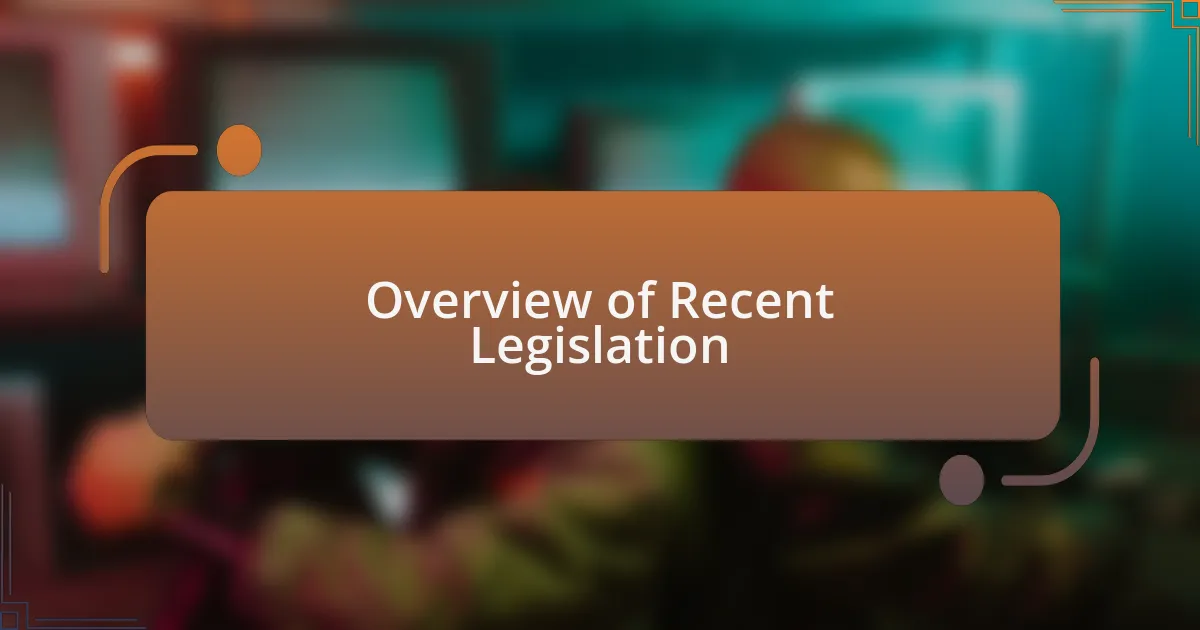
Overview of Recent Legislation
Recent legislation on pro-life issues reflects a dynamic and sometimes contentious landscape. For instance, several states have implemented heartbeat bills, which prohibit abortions once a fetal heartbeat can be detected, often around six weeks into pregnancy. I recall discussing this with a friend who worries about how these laws affect women’s decision-making; it’s a complex moral debate that pulls at the heartstrings of many advocates.
In addition to heartbeat bills, some states have recently moved to protect life by increasing funding for pregnancy resource centers. I remember visiting one of these centers and seeing firsthand the support they provide, from counseling to essential baby supplies. It’s encouraging to see legislative efforts that aim to bolster resources for mothers, highlighting a commitment to life that goes beyond the choice of abortion.
Moreover, there are ongoing discussions about federal and state funding for organizations that advocate for life, raising questions about what priorities we as a society uphold. Personally, I find myself reflecting on how these funding battles impact grassroots efforts. Is there a way to find common ground while still championing the pro-life movement? It’s a vital question that deserves our attention as we navigate these laws and their implications for families and communities.
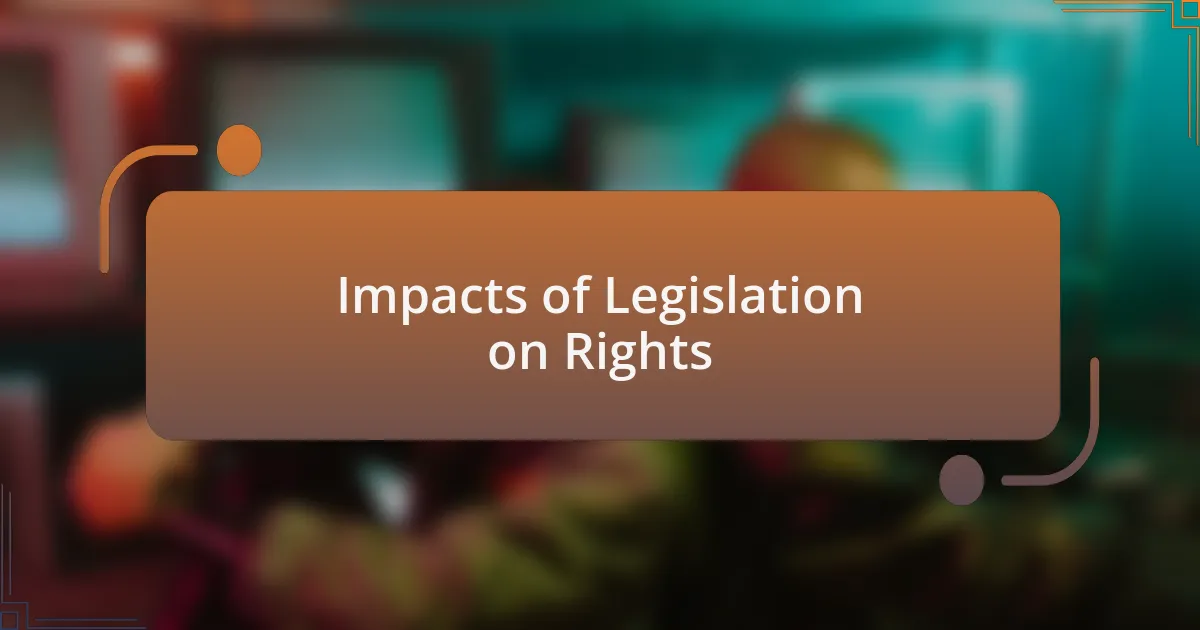
Impacts of Legislation on Rights
When it comes to the impacts of legislation on rights, it’s essential to consider how these laws influence women’s autonomy. For example, the implementation of heartbeat bills can significantly restrict a woman’s ability to make informed choices about her body. I remember chatting with a close friend who felt trapped by such regulations, highlighting the fear many women face when their reproductive rights are curtailed.
Legislation that influences pro-life advocacy not only seeks to protect unborn life but also profoundly affects women’s rights and access to healthcare. I had a conversation with my sister, a healthcare professional, who explained how these laws can create barriers to necessary medical care. It strikes me that while the intention behind these laws may be to protect life, they can inadvertently lead to situations where women feel unsupported and marginalized in their own healthcare decisions.
Additionally, the ongoing legal battles surrounding these laws raise questions about the balance of rights between the unborn and the mother. I often find myself pondering whether we can uphold the dignity of life in all its forms. Each discussion I have with friends rejuvenates my belief that these complex issues require thoughtful, compassionate engagement and persistent advocacy to ensure that all voices are heard.
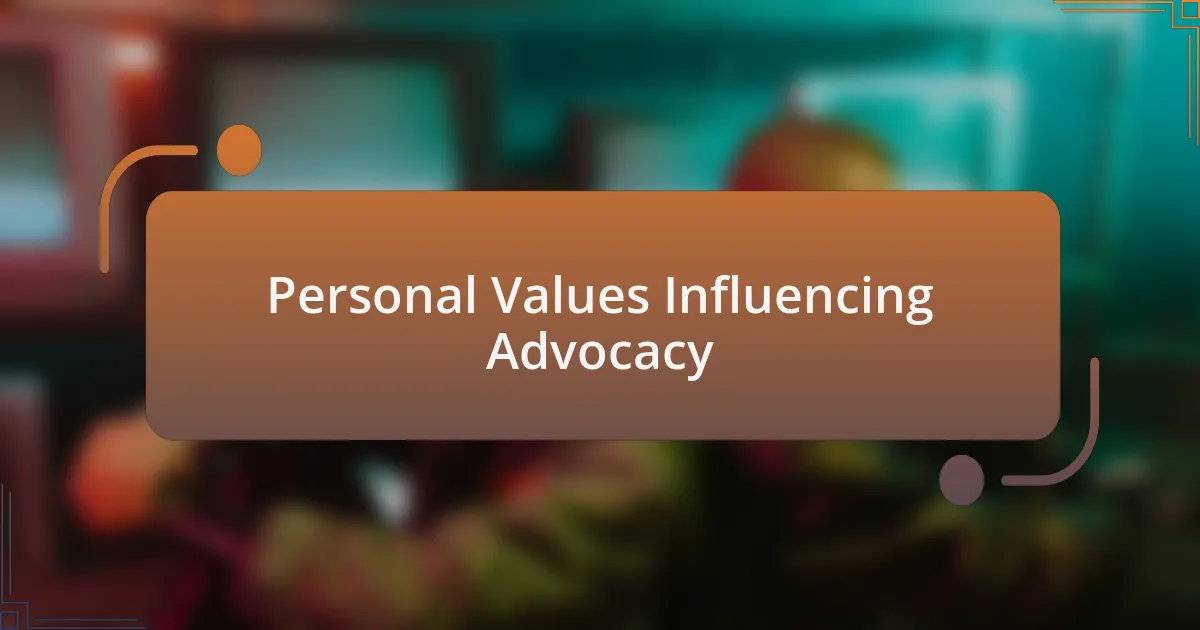
Personal Values Influencing Advocacy
Personal values shape my approach to pro-life advocacy in profound ways. Growing up, I was instilled with the belief that every life has inherent value, which fuels my passion for protecting the most vulnerable. I recall a moment volunteering at a crisis pregnancy center, where I saw firsthand the struggle of young women caught between their circumstances and their choices. That experience made me realize how crucial it is to advocate for both unborn children and the women facing challenging situations.
When I reflect on my values, I often think about the importance of compassion and empathy in advocacy. I remember discussing these concepts with a mentor who taught me that advocating pro-life doesn’t mean disregarding the struggles of women. Instead, it means striving to provide holistic support and understanding. This perspective challenges me to ask: How can we ensure that women feel empowered and supported in their choices while promoting the sanctity of life?
At the heart of my advocacy lies a commitment to dialogue and understanding. I often find myself in conversations where differing views surface, and I realize that my values push me to listen and engage. Have you ever felt a deep connection with someone whose experience starkly contrasts your beliefs? Such moments remind me that advocacy isn’t only about the cause; it’s about building bridges and finding common ground, ensuring that every conversation contributes to a more compassionate discourse.
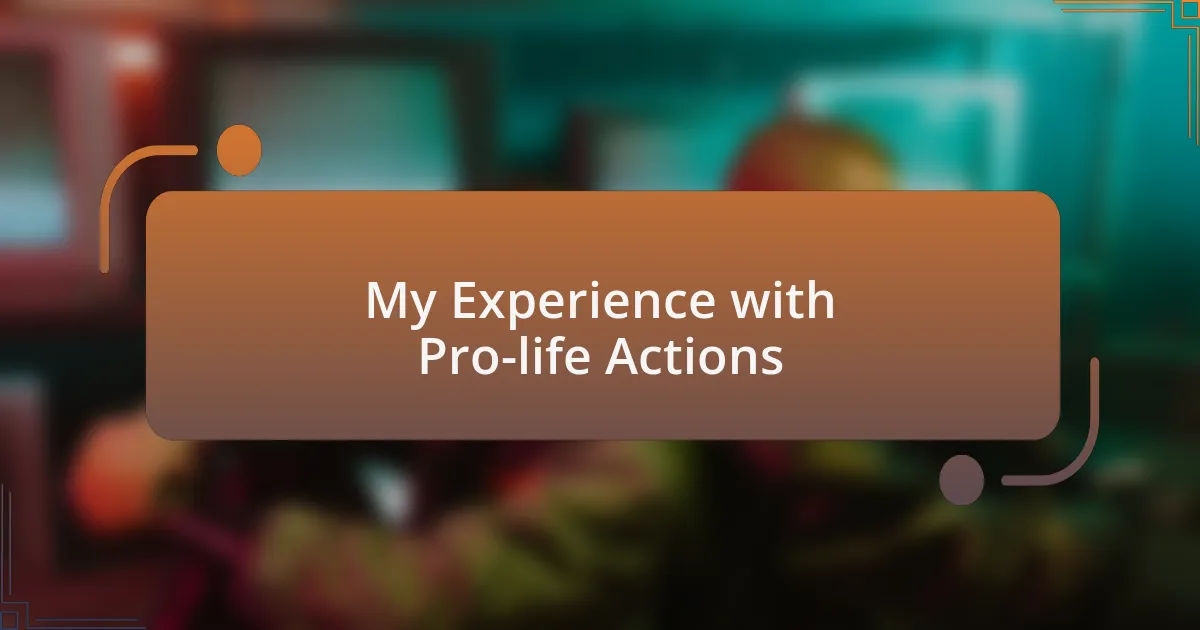
My Experience with Pro-life Actions
While volunteering at a local pro-life event, I witnessed the power of community support firsthand. I remember a woman who shared her story of unplanned pregnancy, visibly torn between fear and hope. Listening to her, I grasped how essential it is to provide a safe space for conversations where individuals can share their struggles without judgment. Have you ever been in a situation where your voice felt lost? Moments like these deepen my commitment to ensuring every voice is heard and valued.
Engaging in advocacy isn’t just about passionate speeches; it often unfolds in the quiet moments of personal connection. One evening, I found myself in a heartfelt conversation with an expecting mother who felt isolated. As we talked, I shared resources that could support her journey. Seeing her face light up with newfound hope reminded me how impactful simple acts of kindness can be. Isn’t it fascinating how a single conversation can change the course of someone’s life?
Participating in peaceful protests has been another significant part of my pro-life journey. I recall standing in a crowd, holding a sign, feeling the collective energy of people united by a shared conviction. In those moments, I understood the importance of standing firm in my beliefs while fostering respect for different views. Was it hard? Absolutely. But embracing that discomfort only fuels my desire to advocate for life with integrity and resilience.
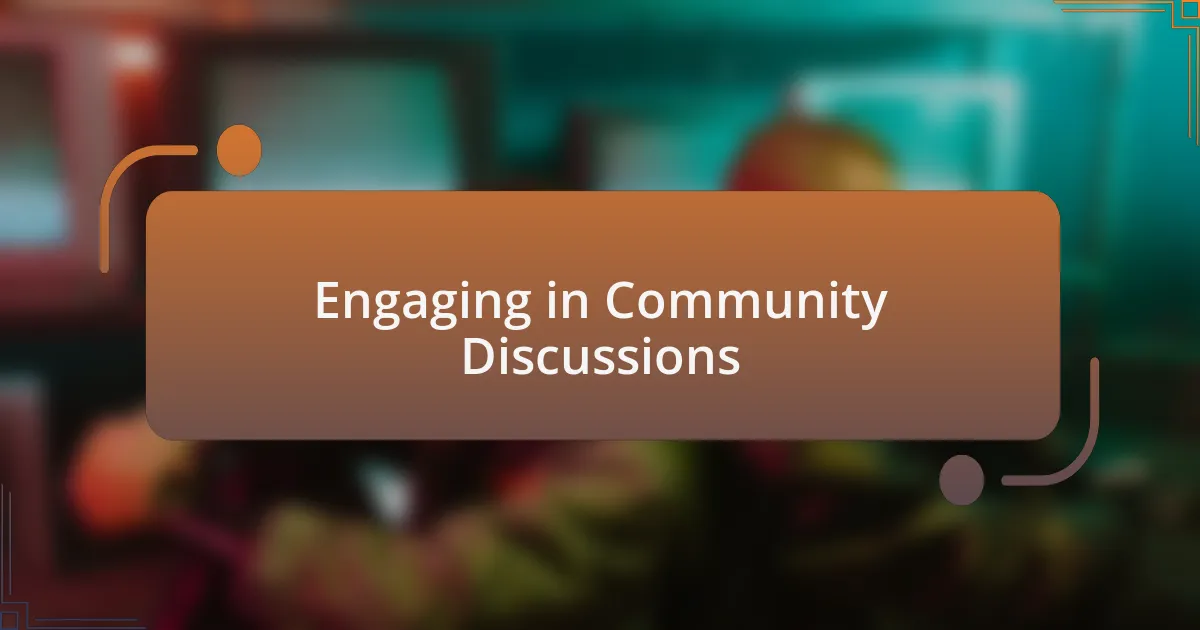
Engaging in Community Discussions
Engaging in community discussions has always struck me as a vital extension of pro-life advocacy. I recall a local forum where differing opinions clashed. Rather than shying away, I chose to share my perspective, hoping to encourage an open dialogue. Have you ever felt the weight of your opinion during a debate? That night, I learned that vulnerability can spark understanding and pave the way for deeper connections.
One unforgettable moment was when a friend and I co-hosted a small gathering to discuss pro-life issues. As we facilitated the conversation, we realized that many people carried personal experiences that shaped their views. Hearing their stories enriched my understanding and reminded me that everyone has a unique journey. Isn’t it amazing how sharing our truths can foster compassion and bridge divides?
Sometimes, I’ve found that the most impactful discussions happen outside structured events. I often engage in casual conversations at coffee shops or parks, where the atmosphere is relaxed. There was one afternoon when an impromptu chat with a stranger turned into a thought-provoking discussion on the importance of supporting mothers in crisis. Each time, I’m reminded that every dialogue—no matter how informal—can contribute to a greater awareness and a stronger community. What small change can you make today to start a meaningful conversation?
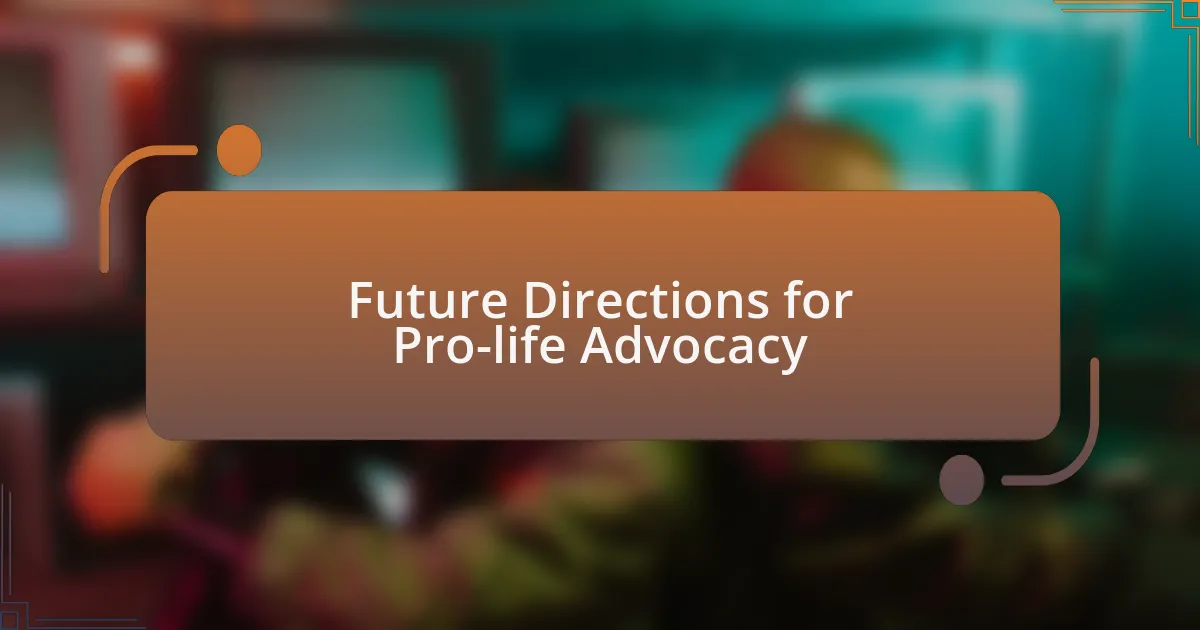
Future Directions for Pro-life Advocacy
The future of pro-life advocacy may hinge on harnessing digital platforms to reach a broader audience. I recall the impact of a viral social media campaign that informed many about the realities of crisis pregnancies. Have you ever witnessed a single tweet spark a wave of conversation? It’s incredible how technology can empower our message, making it accessible to those who may not engage in traditional forums.
In my experience, combining legislative efforts with grassroots movements can create powerful synergies. I remember attending a rally where lawmakers addressed attendees directly, sharing personal stories that humanized the statistics. That moment made me reflect: how can we better connect our advocacy to the personal impacts of legislation? By sharing stories from both sides, we can approach the dialogue with empathy and understanding.
As we look to the future, incorporating educational initiatives in schools may cultivate a more informed youth. I’ve seen firsthand how young people respond positively when given the right tools and knowledge about the complexities of life issues. Could integrating these discussions into health classes empower the next generation to advocate for life more effectively? Revamping our strategies to engage with youth could pave new pathways for lasting change.